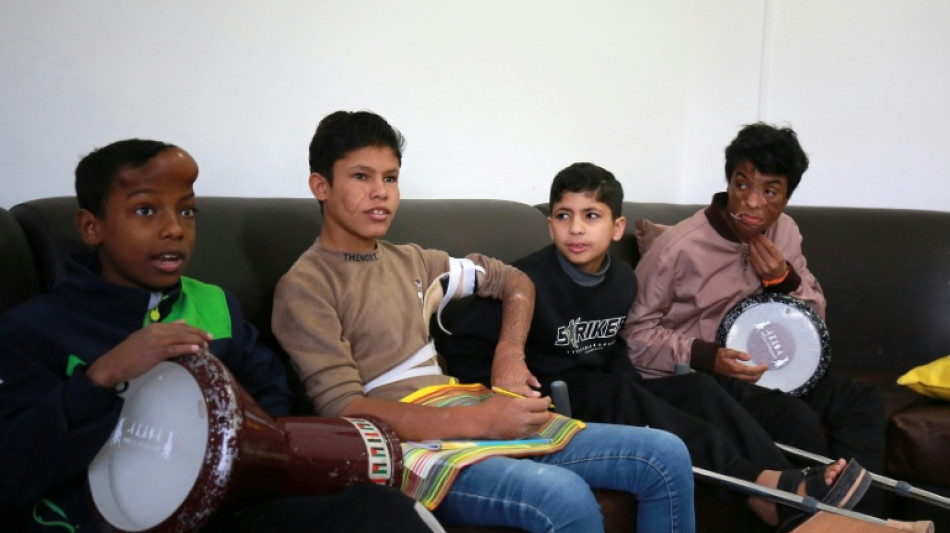
Jordan hospital treats war casualties from across Middle East

Shahd Tahrawi was wounded in an Israeli strike on Gaza, Hossam Abd al-Rahman suffered burns in an explosion in Iraq and bombardment in Yemen has left Mohammed Zakaria in need of multiple surgeries.
They all met at the charitable Al-Mowasah hospital in the Jordanian capital Amman, which treats some of the many civilians wounded in conflicts across the Middle East.
"I feel sad when I look around me in this place" seeing "people like me, innocent, simple civilians" whose lives have been blighted by the horrors of war, said Abd al-Rahman, a 21-year-old Iraqi patient.
"They are victims of war, burned by its fires... but had no part in igniting them," he told AFP.
He is waiting for his ninth operation at the Amman hospital, to treat third-degree burns to his face, neck, abdomen, back and hand he suffered in an accident with unexploded ordnance in his native city of Samarra, north of Baghdad.
"I was a child when I was burned 10 years ago," he said.
"My life was completely destroyed, and my future was lost. I left school even though my dream was to become a pilot one day."
Abd al-Rahman, who had 17 surgeries in Iraq before arriving at the hospital in Jordan, said that through "all these painful operations", he hopes to "regain some of my appearance and life as a normal human being".
At Al-Mowasah, also known as the Specialised Hospital for Reconstructive Surgery and run by medical charity Doctors Without Borders (MSF), Abd al-Rahman said he has found comfort in meeting patients from around the region.
"We spend long periods of time here, sometimes many months, and these friendships reduce our loneliness and homesickness."
- 'They feel safe' -
MSF field communications manager Merel van de Geyn said the hospital has patients "from conflict zones across the Middle East, from Syria, Yemen, Iraq and Gaza".
"We provide them with complete treatment free of charge" and cover the cost of flights, food and other expenses, she said.
In addition to the medical procedures, the hospital places great importance on psychological support.
"Here, they feel safe," said van de Geyn.
"They're surrounded by people who have gone through similar experiences... Mutual support truly helps them."
From her room on the hospital's fifth floor, Shahd Tahrawi, a 17-year-old Palestinian, recalled the night of December 9, 2023, when a massive explosion destroyed her family's home in Rafah, in the southern Gaza Strip.
The Israeli bombardment killed her father and 11-year-old sister, and left Shahd and her mother wounded.
Shahd has had five operations on her left leg, three of them in Jordan.
She said that on the night of the strike, she was woken up by the sound of the explosion and the rubble falling on her.
"I started screaming, 'Help me, help me!'... and then I lost conciousness."
Now, she said her dream was to become a doctor and help "save people's lives, just like the doctors save mine".
- 'Nothing but destruction' -
The hospital was established in 2006 to treat victims of the sectarian violence that erupted in Iraq in the aftermath of the US-led invasion, but has since expanded its mission.
In just under two decades, 8,367 patients from Iraq, Yemen, the Palestinian territories, Sudan, Libya and Syria have undergone a total of 18,323 surgeries for injuries caused by bullets, explosions, bombardment, air strikes and building collapses in conflict.
The hospital has 148 beds, three operating theatres, and physiotherapy and psychological support departments.
In one room, four Yemeni patients were convalescing.
One of them, 16-year-old Mohammed Zakaria, had dreamt of becoming a professional footballer, before his life changed dramatically when an air strike blew up a fuel tanker in Yarim, south of the Yemeni capital Sanaa, in 2016.
The blast killed six of his relatives and friends, his father, Zakaria Hail, said.
"The war has brought us nothing but destruction," said the father, sitting next to his son who is unable to speak after recent surgery to his mouth.
N.Son--SG

 London
London

 Manchester
Manchester
 Glasgow
Glasgow
 Dublin
Dublin
 Belfast
Belfast
 Washington
Washington
 Denver
Denver
 Atlanta
Atlanta
 Dallas
Dallas
 Houston Texas
Houston Texas
 New Orleans
New Orleans
 El Paso
El Paso
 Phoenix
Phoenix
 Los Angeles
Los Angeles


